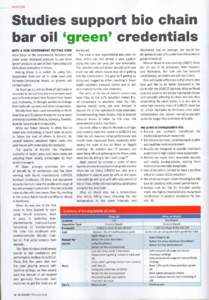Home News Studies support bio chain bar oil "green" credentials
Studies support bio chain bar oil "green" credentials

Studies support bio chain bar oil ‘green’ credentials
With a new government putting even more focus on the environment, foresters will come under increased pressure to use more ‘green’ products as part of their harvesting and silviculture operations in future.
Among these is a switch to using bio-degradable chain bar oil in chain saws and harvester/processing heads, to prevent soil contamination.
As much as 2.5 million litres of lubricants is reckoned to be lost into the environment each year in forests around New Zealand from heads and chainsaws, or through accidental leakage from hydraulic systems and other components.
Bio-oils have been used extensively in North American and European forests for many years and many countries (France, Germany, Sweden, Austria) have made it compulsory.
The our forest industry is often fast to adapt new technology, it hasn’t been as quick to follow the lead of others in bio-oils, for several reasons; perceived higher costs and past issues with some early bio products.
The quality of bio-oils has improved markedly in recent years and more crews are adopting them locally, encouraged by their forest managers.
PF Olsen strongly promotes the use of bio-oils by its contractors and has been working with bio-oil manufacturer, LUBECO, lubricant distributor, Oil Intel, and equipment manufacturers to raise the profile and usage of bio-oils amongst contractors. This has included case studies with two crews; Olsen 80, working in the central North Island and Wise on Wood, in Northland.
|
Olsen 80 was one of the first crews in New Zealand to start using bio-oil products, back in 2012. In switching from predominantly chainsaw-based harvesting to mechanisation, the crew has continued with environmentally friendly chain bar oil, first using samples from Waratah. The Olsen 80 team tried several brands to test consistency and performance, settling on LUBECO. Those first few years also saw the crew playing around with machine settings, as they wound back the amount of oil required and generally fine-tuned their machines to get the most out of the bio-oil. The crew is now experiencing less wear on bars, which can last almost a year, against using two bars per year, per saw previously. The crew has reduced oil use (around 50% less chain bar oil), which means less oil is getting into the environment. The gear isn’t getting as sticky and clogged up either, resulting in fewer health problems (reduced rashes due to oil/skin contact) for the crew members. The price of the bio-oil doesn’t worry crew boss Fitzy, as the 50% reduction makes bio-oil comparable to standard chain bar oils. Against overall costs, oils only amount to around 1% of the operation’s total expenses. Notwithstanding these factors, Fitzy is pleased because bio-oil is better for the crew, the environment and his machines. |
Up north, Wise on Wood’s Michelle and Nigel only recently made the switch to LUBECO’s bio chain bar oil, however initial performance and results have impressed them, especially after seeing the state of the air filters on Nigel’s machine. His reaction was “if standard oils were flying off and adhering to his filters, what were the oils doing to the crew’s lungs?”
Nigel started by running a series of tests against previously used premium grade mineral chain bar oil. Using LUBECO bar lube saw a reduction in volume used by 10% on the same oiler settings and up to 40% after adjustment of the oil flow, whilst still maintaining satisfactory oiling for bar and chain.
Wise on Wood also ran a temperature trial whilst felling trees, checking the bar temperature in the same intervals and discovered that on average, the bio-oil bar temperature was 12% cooler than the premium grade mineral oil.
Wise on Wood is now running LUBECO chain bar oil 150 in its processor, feller buncher and chainsaws. Bar lube use has reduced considerably, yet chains are still well lubed.
One noticeable difference is that chains now look and feel to be better lubricated in the joints with the LUBECO bar lube. Wise on Wood puts this down to the bio bar lube being thicker and naturally adhering to chain and bar, thus penetrating the joints better. It is also due to extra high viscosity index of LUBECO chain bar oil, which maintains its thickness even when temperatures rise above normal/acceptable levels for longer than a mineral oil is able.
Key points to biodegradable oils:
- Bio-oils are synthetic substitutes for traditional petroleum-based oils
- Bio-oils are non-toxic, contributing to a safer and healthier work environment
- Bio-oils are designed to provide maximum protection to high capital value equipment
- Bio-oils are made from renewable sources and readily biodegradable, making them more environmentally acceptable
- Use of bio-oils is claimed to have a positive effect on carbon (CO2) reduction
- Not all oils are equal – when choosing bio-oils look for products with proven performance
- Always look for the EU Ecolabel quality mark, the highest internationally recognised certification of product excellence for bio-oils.
Související produkty
BIPOL 68
Oil, rapeseed oil is used for lubrication with loss saws. Oil BIPOL 68 has higher viscosity and therefore is suitable for stationary saws, harvesters and hot summer season.
Product DetailHydraulic Oil PLUS (HEES)
High performance synthetic hydraulic oil from mixture of saturated and unsaturated esters.
Product Detail Producer of bio-oils and plastic lubricants
Producer of bio-oils and plastic lubricants

